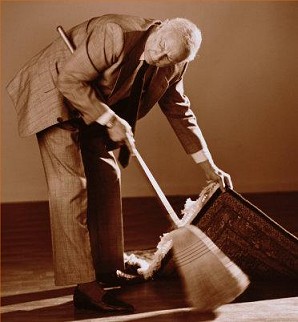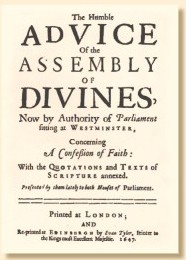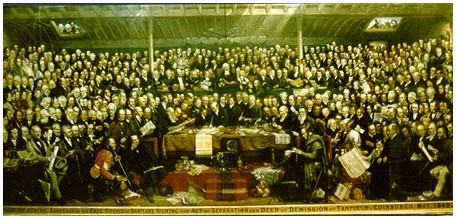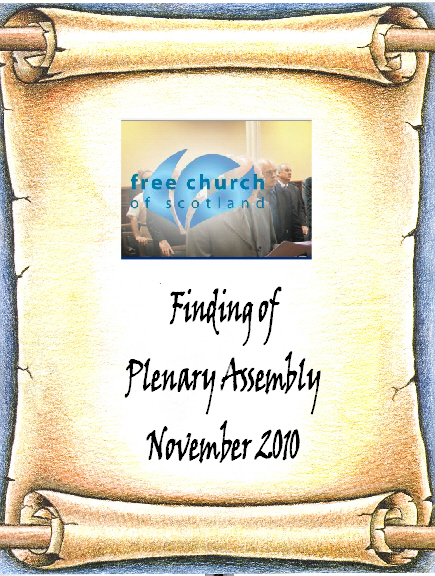 Related Articles
Related Articles
|
|
|
 Images
Images
|
|
|
 Websites
Websites
|
|
|
|
|
Sweeping it under the carpet
In the life of many organisations it is often the case that serious and deleterious flaws remain suppressed and hidden until some other issue arises. It is at that point that foundational cracks are exposed. And in the church(es) it is no different.
 THE recent problem facing the Free Church of Scotland has produced an outcome which has ramifications extending far beyond that denomination. THE recent problem facing the Free Church of Scotland has produced an outcome which has ramifications extending far beyond that denomination.
At a ‘top level’ the outcome relating to the recent songs/instruments debate was the right decision (giving primacy to the local churches) albeit taken for the (secondary and expedient) reason of preserving the denomination as a cohesive whole.
The impact on denominational integrity and cohesion remain to be seen, but the very positive effect of the debate has been to ‘lift the rug’ and expose much of what has been swept beneath the carpet for centuries and through to the present day.
In a recent article which asked the question ‘Are denominations dying Gods’ all the ‘bullet points’ contained within surfaced during this month's Plenary Assembly in Edinburgh.
It is hoped to produce a series of articles shortly which will look into these issues in greater depth. However, for the moment, a quick look at the background, decision and possible implications for the Free Church as a denomination and for the wider church(es) beyond.
Scottish Presbyterianism
and the Free Church of Scotland
The Free Church was formed in 1843. Up until that point the main protestant cohort in Scotland was contained within the Church of Scotland which formed up in 1560 as a direct result of the Reformation in Scotland. John Knox and his protestant followers did not want to form a new church; indeed that idea of two churches was anathema to all both the Protestant and Catholic camps. (One wonders how Knox would view the present scene.)
The 16/17th centuries
 Just over 100 years after the events of 1560, England was embroiled in a series of civil wars and the Scots Protestants regarded these conflicts as an opportunity to take their Reformed Presbyterianism into England. In return for Scottish military support the English gave an assurance to derive a new set of creeds and structure for the Protestants in England, many of whom were puritan and anti-royalist. The agreement was drawn up as a Solemn League and Covenant. Just over 100 years after the events of 1560, England was embroiled in a series of civil wars and the Scots Protestants regarded these conflicts as an opportunity to take their Reformed Presbyterianism into England. In return for Scottish military support the English gave an assurance to derive a new set of creeds and structure for the Protestants in England, many of whom were puritan and anti-royalist. The agreement was drawn up as a Solemn League and Covenant.
From 1644 to 1648 a group of English divines along with six representatives from Scotland drew up a doctrinal document entitled the ‘Westminster Confession of Faith’. Although adopted in England it was abandoned there shortly afterwards (Note 1). However the Confession became the ‘subordinate standard’ for the Church of Scotland and has been ever since. From that time it has become the ‘doctrinal touchstone’ for Presbyterian churches the world over.
19th Century Disruption:
the formation of the Free Church of Scotland
 Fast forward now to the first half of the 19th century. Many leaders in the Church of Scotland had become increasingly disturbed by what they saw as the intrusion of the monarch and/or the state into church affairs (Erastianism). Fast forward now to the first half of the 19th century. Many leaders in the Church of Scotland had become increasingly disturbed by what they saw as the intrusion of the monarch and/or the state into church affairs (Erastianism).
Additionally the practice of feudal landlords having the right to choose and appoint church ministers (Patronage) was also causing serious concern.
As a net effect of these troubles around one third of the Church of Scotland (ministers, elders and people) left the Church of Scotland to form the Free Church of Scotland. Subsequent splits and reunions have produced a very messy history of church development through to the present day.
[ See article ‘Presbyterianism Scottish style’ which includes a sorry ‘road map’ from 1560 onwards. A copy of the chart in that document annotated to show the Free Church over the centuries is available by clicking here.]
21st century Free Church
Most recently a substantial number (minister, elders and people) left the Free Church in 2000 to form the Free Church of Scotland (Continuing). Although the rupture focussed much on disagreements regarding how a disciplinary case was handled, in essence, serious tensions of a ‘progressive v traditionalist’ form lay just beneath the surface. The fact that the person involved in the discipline case was a leading light in the ‘reform’ stable further ‘politicised’ the whole affair.
The split had the effect of removing from the Free Church many leaders and members who were generally older and more traditionalist in leaning. This left the residual Free Church depleted, insecure and also with a larger percentage of progressives in the ranks.
[ As a previous article outlined, the nature and composition the Free Church had and has become very varied in term of demographics, culture, language and background; and this exacerbated the reform/traditionalist tensions while rendering consensus more elusive and difficult to achieve.]
Brought to a head in 2009/10
Pressures for reform increased, and during this period at least one local church whose minister was at the leading edge of 'change', introduced hymns songs and musical instruments into Sunday evening services. This was regarded as both a provocative and embarrassing move by and for the Free Church as a whole, as it drove a coach and horses through prevailing church law relating to ‘worship’. The innovation was introduced by given these evening services the title of ‘fellowship meetings’ as opposed to ‘worship services’: a play on words which adhered to the letter of law while flouting the spirit of the law.
The Plenary Conference and Assembly: crunch time
 In August 2010 an extraordinary Plenary Conference was held in Dingwall as an opportunity for open debate on the issue of whether or not to permit the singing of ‘uninspired praise’ and the use of musical instruments. In August 2010 an extraordinary Plenary Conference was held in Dingwall as an opportunity for open debate on the issue of whether or not to permit the singing of ‘uninspired praise’ and the use of musical instruments.
Subsequently a ‘Deliverance’ was taken to the floor of an extraordinary Plenary Assembly (all ministers and an equal number of elders) in Edinburgh on 18/19 November 2010. [This plenary assembly was only the second such gathering in the history of the denomination: the first having been at its inception.]
Following full discussion, which was by all accounts amicable, a vote was taken. The out-turn showed a 98/84 split in favour of adopting spiritual songs and instruments; with each congregation being allowed to decide on whether to maintain the status quo or opt for the new freedoms.
------------
The Genie is now out of the bottle
It is too early to see how all this will work within the Free Church but what can safely be said is –
-
The decision to allow local congregations to decide on this important issue surely raises the whole question of local autonomy and the place of over-arching bodies such as presbyteries and a General Assembly on other matters.
-
If local congregations are now given licence over this (seen-as-a-very-important) issue, then to what extent should this principle be applied to other features of church form and practice?
-
The fact that the count on the day was split very well illustrates the inherent flaw in the procedure of using ‘voting’ as a mechanism to determine the will of God. The Holy Spirit is not double-minded. And the last time that we see ‘lots being drawn’ in the pages of Scripture was prior to the formation of the church at Pentecost (Acts 1:26). From that time on the Holy Spirit provided the daily guidance. (cf Acts 13:2) (Note 2.)
-
The concept of what constitutes worship is seriously misrepresented (even misunderstood?), artificially prescribed and – in terms defined by the WCF – irregularly practiced (Note 3. )
-
The Bible on its own is not sufficient under the new covenant as the arbiter in every situation. (And this has been well illustrated by the various and conflicting statements and views – all expressed by Bible-believers – in this present issue.) Whilst the Holy Spirit will never contravene the principles and directions given by God in and through His word, the third person of the Godhead is the primary means employed by God the Father in directing His children on issues which are not prescribed by or defined in the Bible itself ( John 16:13/14).
-
Inasmuch as the denomination has made a significant departure from its historical norms any legal cases arising between the Free Church and the Free Church (Continuing) will see the latter on much firmer ground regarding claiming to be the ‘true’ Free Church.
-
Self-evidently, vows to maintain current forms (laws and practices) render any change impossible without causing serious disruption. This places any denomination worthy of the ‘semper reformanda’ (always reforming) maxim in a philosophical and political bind.
Bedrock issues
 The underlying, and even more fundamental matters which the debate brought to the surface are potentially much more serious for the Free Church, the Presbyterian church worldwide and indeed many churches (both modern and traditional) which are not of the Presbyterian fold. The underlying, and even more fundamental matters which the debate brought to the surface are potentially much more serious for the Free Church, the Presbyterian church worldwide and indeed many churches (both modern and traditional) which are not of the Presbyterian fold.
One of the very profound and important issues which Presbyterian churches are choosing to ignore is the extent to which traditions, anachronistic church laws, and the deficiencies and errors in the Westminster Confession of Faith are producing unsustainable hypocrisies, loopholes and unbiblical practices and constraints into regular church life. (A question put to the Free Church in 1989 has never received an answer.)
God sees under our carpets
Many local churches and denominations not least have been brought very low and even destroyed by expediently choosing to ignore serious problems and seeking to ‘cover these over’ in an apparent belief that they are thus rendered invisible to the Almighty and Lord of the church. (cf Ezek 13:10-16; Matt 10:26) Meanwhile legalism and mere tradition, bolstered by out-moded man-made rules are combining to bring many groupings to the point of ruination. (Note 4.)
An observer at the Plenary Assembly concluded his review by saying:
“One final thing that became clear in the debate was that the Free Church does not have a clear definition of public worship.” ( Note 5.)
The whole psalms/instruments debate has exposed enough serious questions to keep Plenary Assemblies going for a long time. But at least the process might now be underway.
We certainly don't want another denomination (God will already be displeased enough with our history). But mere 'denominational realignment' will just not do: this would be tinkering at the edges. If Knox were with us today he would probably be leading another Reformation; and correcting the inherited deficiencies of the last one.
Note 1. One of the main tensions between the Scottish Presbyterians and the English Puritans related to the differing views of who (on earth) should be at the head of the church. Most of the Puritans felt it should be the parliament (i.e. the state); the Church of England and the King (Charles I and II at that time) saw the sovereign as head (under King Hendry VIII’s ‘Divine Right of Kings’); whereas the Scots eschewed both of these views proclaiming Christ Jesus the sole head of the church.
Note 2. Reference is often made to the dispute between Paul and Barnabas regarding whether or not to take John Mark with them on a mission. No satisfactory explanation has been given for this event, however it is altogether possible that they BOTH missed the leading of the Holy Spirit who might have saying to these men that it was time to launch out in two different directions. It is a common mistake to presuppose that yesterday’s format will pertain indefinitely.
Note 3. Worship is essentially from the heart, and it is a dynamic – which may outwork in a tangible and physical expression – of praise, thanksgiving and adoration. We find worship of Father/Son under the new covenant referred to at the level of an individual (Matt 8:2; John 4:21; 1 Cor 14:25; Rev 19:10), small group (Matt 2:11; Matt 14:33; Matt 20:20; Acts 13:2) and the whole assembly (Luke 14:10; Rev. 4:10). Nowhere in the Bible is there found a prescription for when, where and how worship might take place under the new covenant. These OT laws were confined to the old covenant. What happens in a church building on a Sunday morning in a gathering of God’s people might include worship; but there is no guarantee that worship is taking place just because a ‘call to worship’ has been made. Nor, if worship does take place does it necessarily end with the Benediction being pronounced. Moreover, corporate worship might spontaneously break out – and often has – amongst a small gathering in (say) a home on any day of week and at any hour.
Note 4. Whatever the ill-effects of anachronistic practices, there are many traditions which are good and should be sustained. Conversely there are some innovations coming into today's church which are carrying subtle heresies and deviant influences. Discretion is a key requirement for the days in which we live (Matt 24:4). See article ‘Truth, Error and Deception'.
Note 5. The term ‘public worship’ is an artificial term. And it is at this point that we come to the afore-mentioned Westminster Confession of Faith which ‘Of Religious Worship, and the Sabbath Day’ (XXI/V) states:
The reading of the Scriptures with godly fear, the sound preaching and conscionable hearing of the Word, in obedience unto God, with understanding, faith and reverence, singing of psalms with grace in the heart; as also, the due administration and worthy receiving of the sacraments instituted by Christ, are all parts of the ordinary religious worship of God: beside religious oaths, vows, solemn fastings, and thanksgivings upon special occasions, which are, in their several times and seasons, to be used in an holy and religious manner.’
The above could easily be dissected on a significant number of points; but suffice to say at this juncture it is not likely that there is any Free Church congregation which includes the Lord’s Supper at every ‘worship’ service. However there is a much bigger question relating to how the Lord's Supper is observed. Current practice has strayed far from what Christ modelled to his disciples on that pre-crucifixion evening. [More later d.v.]
|
Christians Together, 05/12/2010
|
(page
1
2
3
4)
| |
|
Martin Lisemore |
22/03/2011 12:49 |
There's nothing sly in the article above, or in the comments posted.
I suggest Mr Wilson is defending the indefensible. His rather prickly reaction suggests an over active mind, or a personal recognition the cause is already lost.
Comments?
|
| |
|
Andrea M |
22/03/2011 13:07 |
"Scripture IS the sufficient rule for all true Christians."
Well, at least we are in agreement there!
|
| |
|
Martin Lisemore |
22/03/2011 13:14 |
How right you are, Andrea. But I've yet to understand how we get such diverse theologies and doctrines from the same text.
Of course, I fully realise the Holy Spirit lights this to one, and that to another, but the substance of the whole remains the same.
It occurs to me, we create legalisms from Scripture, beat each other around the head with them until a church splits off, as with the Bretheren and Pentecostals.
Not very Godly.
|
| |
|
Paul Whitworth |
22/03/2011 13:58 |
I would say that mistakes comes from people listening to what is said about scripture rather than what scripture actually says its self.
Look at the Amish, they are appostate if they read scriptures in English.
Look at Catholicism, the people are told that they can't understand scripture and it must be interpreted for them.
Many of the problems in Scotland come from people holding fast to the likes of Calvin and Knox and not measuring what they said and established against scripture. Psalms only, sabbatarianism, head coverings etc. Its pure legalistic religion!
|
| |
|
Paul Whitworth |
22/03/2011 14:02 |
Not that singing Psalms, or keeping a sabbath day or women covering their heads is wrong, we each do as we see fit unto the Lord, we are all different, thank goodness!
|
| |
|
Andrea M |
22/03/2011 14:53 |
Psalms are lovely in along with all the other lovely hymns which have been penned over the years. There are also lovely new hymns too as well as ridiculous PC rubbish.
Moses and the children of Israel composed and sang a song when God took them safely across the Red Sea. They didn't have psalms to sing as they hadn't yet been written! Did God think any less of their worship? I doubt it.
|
| |
|
(Guest) |
03/12/2014 21:57 |
Penny,
Many of the Psalms, including Psalm 106.7-12 were penned because of the great salvation that God wrought for "Moses and the children of Israel"! The "Song of Moses" WAS indeed a Psalm, many hundreds of years before king David arrived on the scene-they praised God, BECAUSE they WERE saved by His mighty hand!
But sadly, (the very next verse) "They soon forgat His works..." Psalm 106.13. (note the similarity with today's Gentile Christianity?)
Many today forget that the "Book of Psalms", in the Hebrew, simply means the "Book of praises"-Praise His holy Name!
Now, the editor of this site disabled comments on the topic "Top UK Christian bands coming to Inverness" for reasons best known to himself, but the point I was trying to get across, is that your comment "...free to worship in the manner which brings them closest to God", is open to any interpretation, is it not? I NEVER said you worshipped golden calves etc, but, I believe we should try to be Biblically precise when worshipping? This is why I mentioned the golden calf, and the strange fire that was offered by the sons of Aaron. Today, many do not comprehend Biblical worship, I believe, when we have any spare time, if we could only grab our Bibles, and read/study them, that IS true worship-2 Timothy 2.15. But of course, we should sing, and play Biblical musical instruments to His Name, and let the words that come from our lips be according to Biblical praise?
It does, warm, and gladden my heart that you believe the moral law is eternally binding on the New Testament believer! Many (including the editor, simply cannot see this).
I have noticed, visiting various pages on this site that you are not in the best of health?
May God be pleased to bless you, and keep you for many years hence, and know that this world is soon passing away, and our inheritance, purchased by the Blood of the Lamb is ETERNAL!
|
| |
|
Editor |
03/12/2014 22:44 |
"Now, the editor of this site disabled comments on the topic "Top UK Christian bands coming to Inverness" for reasons best known to himself,"
Guest, the main reason I restrict (i.e. NOT disable) the comments facility is because of the persistent refusal by those who purport to be Christians continuing to post anonymously.
And incidentally the moral law is still in effect; in fact Jesus made two of these even more stringent. So these apply to Gentile believers (who were never part of the Mosaic Covenant - as those who are into Replacement Theology seem to believe).
However if you wish to keep posting then either register or send me an e-mail (as I tend not to dialogue with faceless persons).
|
| |
|
(Guest) |
03/12/2014 23:20 |
I am NOT "faceless" God knows who I am. You give all and sundry the 'free use' of your website. I am not necessarily dialoguing with you, but with your site visitors, and indeed your members.
Now, as to your latest comment, certainly, I am against 'replacement theology' in all its forms, would you be so kind as to enlighten me as to which laws Jesus "made two of these even more stringent"? The Bible teaches NO such thing, what you are in effect saying is that there is an even higher standard of righteousness required of the NT believer as opposed to the OT believer? Absolute nonsense!
But, no doubt this particular avenue of communication may soon be closed. Prayerfully not.
May the Lord bless your website.
|
| |
|
Editor |
04/12/2014 09:58 |
"Now, the editor of this site disabled comments on the topic "Top UK Christian bands coming to Inverness" for reasons best known to himself,"
Guest, the main reason I (sometimes) restrict (i.e. NOT disable) the comments facility (on a very few articles) is because of the persistent refusal by those (few) 'Christians' who post repeatedly behind the mask of anonimity. All articles are open and available for posting from site members.
And incidentally the moral law is still in effect; in fact Jesus made two of these even more stringent. So these apply to Gentile believers (who were never part of the Mosaic Covenant - as those who are into Replacement Theology seem to believe).
However if you wish to keep posting then either register or send me an e-mail (as I tend not to dialogue with faceless persons).
|
(page
1
2
3
4)
|
|
|